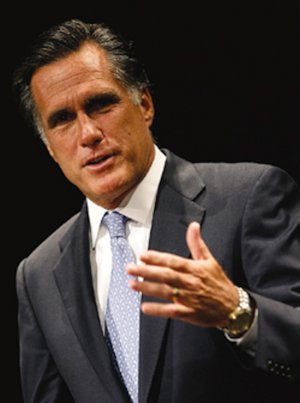
The Candidates and Domestic Policy 2012
[A quick addendum to my last entry: The folks over at Science Debate have published the candidates' answers to various scientific questions this year. You can read them on the website, but it is clear--at least to me--that my conclusions concerning the candidates and science are not that far off the mark.]
 | | He has crib notes on his palm |
"Domestic Policy" is a pretty broad term that can cover a wide range of subjects. For the purposes of this entry in my series of blogs about the current presidential election, however, I am going to restrict my discussion of domestic policy to education, healthcare, drugs, and immigration. There are other domestic issues I will be getting to later, when I talk about social issues and the economy, but I want to stick here to areas where the government manages big domestic projects that don't have overriding social implications.
The Libertarian in me is bound to come out very clearly in this entry, as this is where I consider myself the most fervent in defense of free market capitalism and keeping government intervention to an absolute minimum. As such, I am capable of getting into major disagreements with both party platforms when it comes to domestic policy: I don't like the federal government getting involved with micromanaging our education and healthcare systems, but I also don't like it enforcing draconian drug laws that are theoretically designed to protect us from our own vices. Having said that, I will try to maintain as open a mind as possible, especially when it comes to immigration, the one domestic issue that I find myself the most conflicted over.
I will, as always, assume that both presidential candidates have the best of intentions, because it is not helpful to assume the opposite. I am not interested in entertaining talk about the difference between campaign promises and political reality--at least not for the purposes of this exercise--and I do not care to decide which side is lying more than the other. I will take them at their word and present the ideas that they have put forward, because there is plenty of disagreement between the two candidates without having to get personal or partisan about it.
Education
If you want to discuss the future of America, you have to acknowledge that education is a critical component. Our system is far from the best in the world, and there is plenty of blame to go around. You can try to pin it on government red tape, teacher's unions, No Child Left Behind, or inadequate funding, but I happen to believe that the system needs a fundamental restructuring in order to achieve the best results. It should come as no surprise to readers of this blog, therefore, that I think allowing free market economics to do its work would be far more effective than increased central planning and government intervention. Still, I try to be a realist and I know that nobody's going to win a presidential election on a platform of privatizing education. Therefore, my decision will come down to which candidate will do the most to loosen government controls and increase parental choice so that my child can have an education that is as modern and excellent as possible.
 | | Neck ties: the cruelest thing about charter schools |
Mitt Romney's website talks generally about Romney's commitment to "a culture of high expectations, accountability for results, and increased parental choice" [1]. It goes on to discuss Romney's record as governor of Massachusetts in vetoing legislation that would restrict the creation of new charter schools, and in proposing a new higher education scholarship (the John and Abigail Adams Scholarship). If you dig a little deeper, you can find a far more detailed plan for how Romney would approach education at the federal level, called "A Chance for Every Child," a 35 page document that discusses things like making Title I and IDEA funding portable so that low income and special needs students can have more freedom of choice, opening up funding for charter schools, expanding the DC Opportunity Scholarship Program, reforming No Child Left Behind, offering more flexible block grants to states that "adopt policies to advance and reward teacher quality," strengthening financial aid for higher education, and welcoming private sector participation [2]. However, he also favors cutting nondiscretionary spending across the board, which includes education, and that "more funding for the status quo will not deliver the results that our students deserve," though he does not support wholly eliminating the Department of Education, as some of his primary opponents did.
Like Romney, President Obama talks on his website about increased scholarship and financial aid (funding for which he says he doubled during his first term) and reforming No Child Left Behind [3]. Unlike Romney, he talks about college tax credits and student loan reform that includes capping the percentage of income that can be required of loan collecters and having entire loans forgiven after ten years. He also proudly talks about preventing "161,000 teacher and school staff layoffs," along with his Race to the Top program, which has demonstrably improved competition and education standards across the nation. Though he doesn't have a specific, detailed plan for the next four years, his record speaks for itself in describing a president who believes in increased federal funding for education and higher standards that are enforced by Washington.
Healthcare
This is the most straight-forward issue in the 2012 election, even though it is shrouded in shrill vitriole, misinformation, and paranoid confusion. With the passage of the Affordable Care Act (or PPACA, or Obamacare), President Obama expended an incredible amount of political capital to push this country forward, either towards a fiscal entitlement cliff or a brighter future for healthcare, depending on who you ask. Sufficed to say, either you like the Affordable Care Act or you want it dismantled, and there is little room for grey area in this presidential election. For me, of course, though I believe healthcare reform is absolutely necessary, I am uncomfortable with government mandates over insurance companies, unelected panels of bureaucrats making general healthcare decisions for the entire populace, forced commerce that punishes the poor with penalties for noncompliance, and an absolute refusal to increase market competition or do anything about our broken malpractice system. I am sure many of my dear readers disagree, but I am a firm believer that the immediate repeal of the Affordable Care Act will reduce uncertainty for businesses small and large, stimulate the economy, and put us on a more rational path towards careful, incremental healthcare reform built on a foundation of liberty for all. This is the only logical course of action.
 | | Thank you, generic Google images! |
Romney's plan, as laid out on his website, goes like this: "On his first day in office, Mitt Romney will issue an executive order that paves the way for the federal government to issue Obamacare waivers to all fifty states. He will then work with Congress to repeal the full legislation as quickly as possible. In place of Obamacare, Mitt will pursue policies that give each state the power to craft a health care reform plan that is best for its own citizens. The federal government’s role will be to help markets work by creating a level playing field for competition" [4]. He goes into more specifics, but the basic "repeal and replace" is one of the cornerstones of his campaign, one about which he is not shy of boasting. There are certain popular aspects of the Affordable Care Act that he wants to keep--such as keeping "pre-existing conditions" from affecting the price of insurance--but he is unequivocal about this being a priority for his very first day in office.
Naturally, President Obama has no interest whatsoever in repealing the Affordable Care Act or in doing anything to stop it from going into full effect in the next few years. Still, I looked on his website to see what his plans are for the next four years, but the entire healthcare section is an impassioned defense of the Affordable Care Act with no indications that the president will pursue further legislation or regulation in the future. The bottom line for Obama, it seems, is that a vote for him is a vote in favor of keeping the Affordable Care Act as is.
-e. magill 9/11/2012
|
|